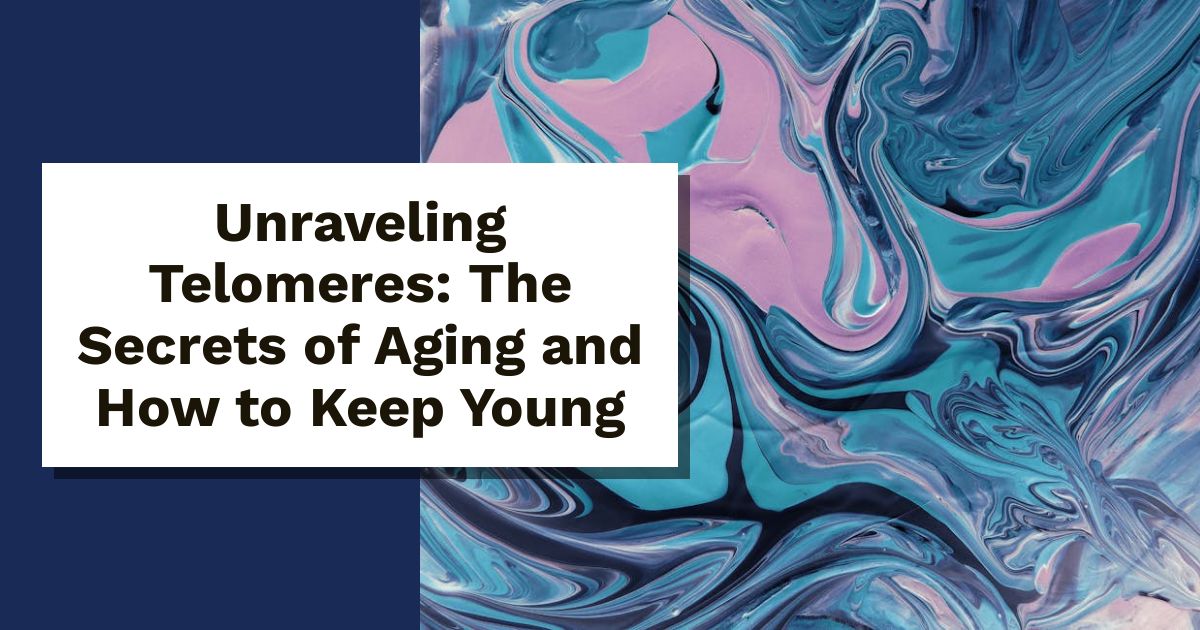Ever wondered why some people seem to age slower than others? The answer might lie in tiny structures called telomeres. These protective caps at the ends of our chromosomes play a significant role in how quickly our cells age. As we get older, telomeres shorten, leading to cellular aging and various health issues.
In this post, we’ll dive into what telomeres are and why they matter. You’ll learn how they influence the aging process and discover tips on how to maintain their length. Whether you’re a biohacking enthusiast or just curious about aging, this exploration can give you insights into preserving youthfulness. Get ready to unlock some of the secrets that could keep you feeling young longer!
What Are Telomeres?
Understanding telomeres is crucial when discussing aging. These unique structures safeguard our chromosomes, which carry our genetic information. Without telomeres, our DNA would be susceptible to damage, leading to issues ranging from premature cellular aging to serious diseases. Let’s break down their structure and functions to see why these little caps are a big deal.
Structure of Telomeres
Telomeres are fascinating because they are composed of repetitive DNA sequences. Essentially, think of them as protective caps at the ends of your chromosomes. Each chromosome has two telomeres, one on each end. They consist of the sequence “TTAGGG” repeated several hundred to thousands of times.
This unique structure serves multiple purposes:
- Protection: Telomeres shield the ends of chromosomes from becoming frayed or tangled, just like the plastic tip on shoelaces prevents fraying.
- Structure: They help maintain the integrity of our chromosomes during cell division, ensuring that genetic information is copied accurately.
For further insights into the structure of telomeres, check out more from the Genome.gov.
Function of Telomeres
Telomeres perform essential roles in maintaining cellular health, and understanding these functions can provide valuable insights into aging.
- Cellular Aging: Each time a cell divides, its telomeres get shorter. This shortening limits the number of times a cell can divide, eventually leading to cellular aging and death. Think of telomeres as a countdown timer for cell life.
- Preventing Genetic Damage: Telomeres play a crucial part in protecting our chromosomes from damage. By capping the chromosome ends, they prevent genetic data from being lost or corrupted during cell division.
- Aging and Disease Link: Research indicates that shorter telomeres are associated with various age-related diseases, including cancer and heart disease. This connection makes telomeres a focus in understanding how we age and how to potentially slow it down.
For detailed information on how telomeres function, explore Roles of telomeres and telomerase.
Understanding telomeres helps demystify the aging process. These tiny structures may hold the key to maintaining our health as we age, making it essential to keep them in tip-top shape.
Telomeres and Aging
Telomeres play a crucial role in the aging process, acting as protective caps on our chromosomes. As we age, these structures experience significant changes that can affect our overall health and longevity. Let’s break down how telomeres shorten, their impact on cell lifespan, and the diseases related to this shortening.
Telomere Shortening
Every time a cell divides, its telomeres shorten a bit more. Imagine a fuse burning down; each division chips away at the telomere until it’s so short that the cell can’t divide anymore. This shortening is a natural part of cellular aging, setting a kind of limit on how many times cells can replicate. In human somatic cells, the telomere length starts to decrease significantly after around 50 to 70 divisions. Once they reach a critical short length, cells enter senescence, meaning they can no longer divide or function properly. This process is explored more in detail in the Mechanisms of telomere loss and their consequences.
Impact on Cell Lifespan
With each division, telomeres act like a cellular clock, counting down until the cell can no longer replicate. This limit plays a direct role in how long our cells – and therefore our bodies – can continue to thrive. When telomeres get too short, cells might die off or stop functioning, contributing to tissue degeneration and various age-related changes. It’s like a bank account with a fixed amount; once you’ve spent it all, you can’t make any more withdrawals. A comprehensive look at this is available in the article on Telomere Length, Aging, and Somatic Cell Turnover.
Role in Age-Related Diseases
Shortened telomeres are not just about aging; they are linked to a variety of health issues, including cancer and heart disease. When cells lose their ability to divide, it can lead to a buildup of damaged cells, potentially paving the way for diseases. Research suggests a connection between telomere shortening and conditions like idiopathic pulmonary fibrosis and even some cancers. The association between telomeres and these age-related diseases is well documented in resources like Telomeres and age-related disease. Understanding this relationship emphasizes the importance of telomere health in preventing age-related ailments.
In summary, telomeres play a pivotal role in the aging process. Their shortening contributes to limited cell lifespan and is linked to several age-related diseases. Maintaining telomere health could be key to living a longer, healthier life.
Can We Influence Telomeres?
Our telomeres may not be all-powerful, but we can give them a helping hand. By making specific lifestyle choices, we can support telomere health and perhaps slow down aging. Let’s explore some actionable ways to influence these fascinating structures.
Diet and Nutrition
What you eat directly impacts your telomeres. Nourishing your body with the right foods can help maintain telomere length. Here are some top picks to consider:
- Fruits and Vegetables: Go for a rainbow of colors! Blueberries, oranges, and leafy greens are loaded with antioxidants that fight oxidative stress.
- Legumes: Beans and lentils are not just hearty; they raise your fiber intake and promote good gut health, which is linked to longer telomeres.
- Whole Grains: Foods like quinoa and brown rice provide complex carbohydrates and essential nutrients, supporting overall health.
- Nuts and Seeds: Almonds, walnuts, and flaxseeds are packed with omega-3 fatty acids and other nutrients that are beneficial for telomeres.
- Green Tea: This flavorful drink is full of polyphenols, which may help preserve telomere length.
For more insight on foods that promote telomere health, check out Five Foods That Protect Your Telomeres and Extend Your Life.
Exercise and Telomeres
Feeling a bit sluggish? Time to get moving! Regular physical activity has a surprisingly positive effect on telomeres. Here’s how:
- Endurance Training: Activities like jogging, cycling, and swimming can increase telomere length. They activate telomerase, the enzyme that replenishes telomeres.
- High-Intensity Interval Training (HIIT): Short bursts of intense exercise have been shown to be particularly effective for telomere health.
- Consistency is Key: Aim for regular workouts. Even simple activities like brisk walking or dancing can contribute to longer telomeres.
Studies show that those who engage in regular physical activity enjoy better telomere maintenance compared to more sedentary folks. For detailed information about the exercise-telomere link, visit Physical Activity and Telomere Length: Impact of Aging.
Stress Reduction Techniques
Chronic stress is not just a mental burden; it can actually cause your telomeres to shorten. Here’s how to keep stress in check:
- Mindfulness and Meditation: Consider mindfulness practices to calm your mind. Techniques like meditation can lower stress hormones, benefiting telomere length.
- Deep Breathing Exercises: Take a few minutes each day to focus on your breath. This practice can help decrease anxiety and promote relaxation.
- Engage in Leisure Activities: Find hobbies that make you happy, whether it’s painting, gardening, or playing an instrument. Enjoying life can help combat stress and maintain telomere structure.
By adopting these stress-reduction techniques, you can positively influence your telomere health. For more strategies, visit 5 Strategies to Slow Telomere Shortening.
Supporting your telomeres isn’t just about one thing; it’s about creating a lifestyle that fosters longevity and resilience. Start making those small choices today for a healthier tomorrow!
Research and Future Directions
The study of telomeres is gaining momentum, opening avenues for innovative research and therapies aimed at preserving their length. Understanding these developments can significantly impact how we approach aging and health.
Emerging Therapies
As scientists uncover more about telomeres, several exciting therapies are emerging. These new approaches aim to maintain or even lengthen telomeres, which could lead to healthier aging.
- Telomerase Gene Therapy: This method seeks to boost telomerase activity, which can delay aging in cells. Studies show that boosting telomerase can lead to improvements in health markers. For a closer look at this therapy, check out Unlocking longevity: the role of telomeres and its targeting.
- Telomere Activators: Some substances, like TA-65, have shown promise in extending telomere length. Research suggests it may lead to improvements in age-related health markers in humans. Learn more about this at Telomere-driven diseases and telomere-targeting therapies.
- Hyperbaric Oxygen Therapy: Recent studies indicate this therapy may increase telomere length while decreasing immune system aging. For details on this prospective trial, check Hyperbaric oxygen therapy increases telomere length.
Each of these therapies brings us a step closer to the possibility of extending not just our life span, but our health span as well.
The Role of Genetics
Genetics plays a vital role in determining telomere length. Understanding this genetic influence can help us identify factors that contribute to aging and age-related diseases.
- Heritability of Telomeres: Research shows that telomere length is strongly inherited. Certain genetic variations influence how long or short our telomeres might be, which can affect our lifespan. For more on this, read Polygenic basis and biomedical consequences of telomere.
- Environmental Influences: While genetics is significant, environmental factors also impact telomere length. Lifestyle choices like diet, exercise, and stress management can either enhance or shorten telomeres. A study discussing these factors can be found at Genetic, parental and lifestyle factors influence telomere.
- Paternal Influence: It’s fascinating to note that telomere length can also be paternally inherited. This suggests that a father’s genetics can impact the telomere length of their offspring, influencing their future health outcomes. Delve deeper into this concept in the article Telomere length is paternally inherited and is associated.
Understanding the genetic components of telomere length not only highlights the complexity of aging but also opens doors for personalized interventions that target telomere health.
Conclusion and Key Takeaways
As we explore the intricate relationship between telomeres and aging, it’s clear that these structures hold significant importance in our quest for longevity and health. By uncovering their roles, we can better understand how to maintain not only our youthfulness but also our overall well-being.
Telomeres and Aging
- Shortening Matters: Telomeres shorten as we age, functioning like a biological clock for our cells. Each cell division brings them closer to their limit. Once they get too short, the cell can’t divide anymore, leading to aging and degeneration.
- Health Connection: Shorter telomeres link to various age-related diseases, including heart disease and cancer. This shows the need to prioritize telomere health.
For more on the connection between telomeres and aging, visit Telomeres, lifestyle, cancer, and aging – PMC.
Influencing Telomere Length
- Lifestyle Impact: Diet, exercise, and stress management significantly affect telomere length. Eating a balanced diet rich in fruits, vegetables, and whole grains can help. Regular physical activity, especially endurance and high-intensity workouts, has a positive effect as well.
- Stress is a Telomere Thief: High-stress levels can accelerate telomere shortening. Incorporating mindfulness, meditation, and leisure activities can mitigate stress and support telomere integrity.
Discover more about telomere health through Telomeres: History, Health and Hallmarks of Aging – PMC.
Future Research Directions
- Emerging Therapies: Exciting advancements focus on telomerase gene therapy and telomere activators like TA-65. These innovative treatments aim to extend telomeres and potentially delay aging.
- Genetic Insights: Genetics play a vital role in determining telomere length, with some variations inherited from our parents. Understanding genetic influences can lead to personalized approaches to health.
For further insights into the latest findings, check out Telomere Length as a Marker of Biological Age.
The Bottom Line
Taking steps to promote telomere health can pave the way for better aging and overall wellness. By adopting healthier habits, staying informed on new research, and being proactive about our well-being, we can embrace the journey of aging with greater confidence and vitality.
Conclusion
Understanding telomeres opens up a world of possibilities for healthier aging. These tiny structures are more than mere caps; they are key players in how we age and stay healthy.
By making mindful choices about diet, exercise, and stress management, you can support your telomeres. Think about what you eat today. Will it help maintain your telomere length?
Engage with emerging therapies as they develop. Keep an eye on the research. The future looks promising for those interested in biohacking.
How will you prioritize your telomere health? Small changes can lead to a brighter, healthier tomorrow.
Brooke is a rock-climbing 🧗♀️, tennis-playing 🎾, biohacking 🧬 bookworm 📚 on a mission to unlock the secrets of health, longevity, and living life to the fullest 🌟. When she’s not scaling cliffs, hitting the courts, or testing out the latest hacks, you’ll find her nose in a book or adventuring with her four-legged best friend 🐕 by her side. With a knack for turning science into simple, actionable tips, Brooke’s writing is your guide to hacking your biology and living your best, most vibrant life!


